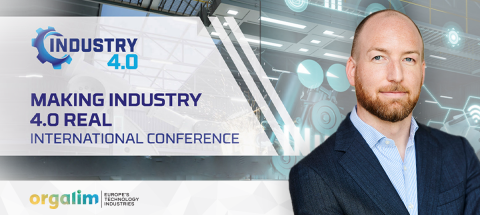From crisis to transformation: empowering advanced manufacturing in Europe
19 October 2022
This was the main message delivered by Orgalim’s Director General, Malte Lohan, giving a keynote presentation at the seventh annual Making Industry 4.0 Real 2022 conference in Vilnius, Lithuania, today.
Strategic autonomy in manufacturing
The EU’s ambitious green and digital objectives are heavily dependent on a shift to Industry 4.0 and advanced manufacturing technologies. The current geopolitical context and the resulting energy crisis make this transition more difficult, but also more pressing, he pointed out.
“The current geopolitical context and the resulting energy crisis make Europe’s industrial transformation more difficult, but also more pressing.”
For Europe’s manufacturers to maintain their competitive edge, Lohan emphasised the need to ensure the EU’s push for ‘strategic autonomy’ reflects the needs of Europe’s advanced manufacturing and technology companies. To that end, he highlighted three broad policy priorities: preserving companies’ resilience in managing their supply chains, creating the required conditions for investment, and ensuring Europe’s internal market is fit for purpose.
Getting it right for SMEs
Empowering advanced manufacturing is especially important for the hundreds of thousands of smaller companies that are the backbone of European industry and whose ability to achieve ‘competitive sustainability’ is fundamental to the success of the EU’s industrial transformation. “Smaller European manufacturing companies have been quick to adjust to today’s challenging circumstances,” he said. “But for them to thrive long term, we need the right policy conditions so they can make the required investment decisions now – recognising that they are typically heavily export dependent, with complex integrated global supply chains, and with heavy vulnerability to regulatory overreach.”
Following his keynote presentation, Lohan also joined a panel discussion on How can technological transformation contribute to industrial resilience and sustainability? together with leading representatives from Lithuania’s technology industries and the Director of Lithuania’s Innovation Agency, Romualda Stragienė.
Tomorrow, he participates in the Annual Economic Forum of the Lithuanian Confederation of Industrialists, also in Vilnius, together with other high-level speakers from European institutions, governments, industry and NGOs.
Orgalim recently published its latest edition of Technology at Heart report – Competitive high-tech manufacturing – focused on Lithuania and produced in collaboration with LINPRA. The report features case studies from three Lithuanian technology manufacturing companies deploying industrial AI, automation and robotics to innovate, compete and thrive.

LATEST NEWS
How can we create a dynamic, competitive European high-tech manufacturing base?
Orgalim's key recommendations offer policymake...

